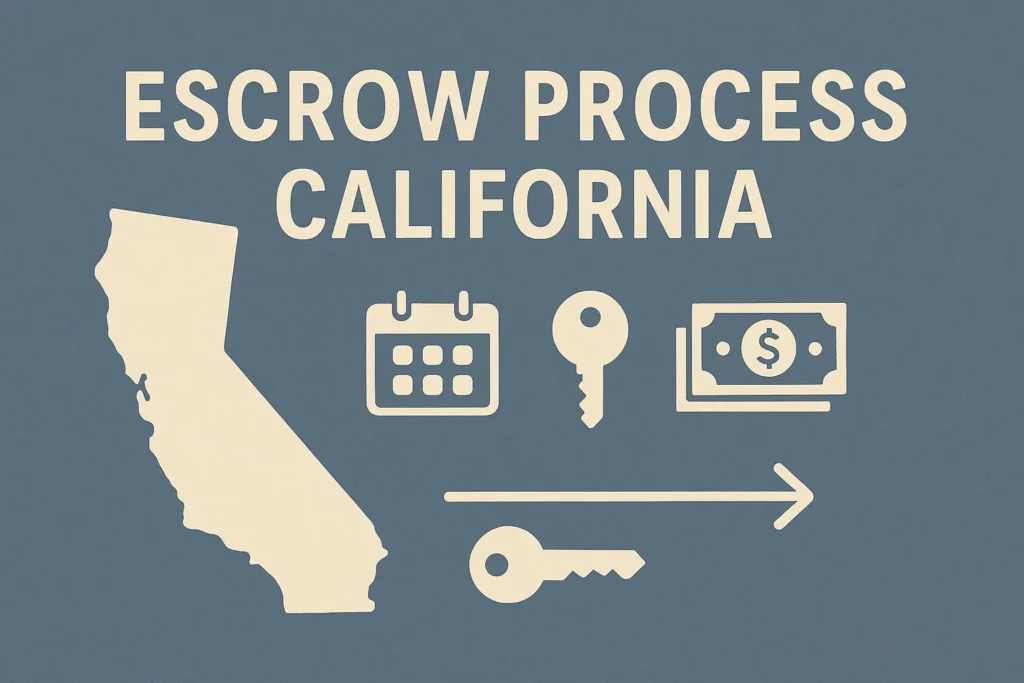Understanding the California Escrow Process: A Comprehensive, Step-by-Step Timeline
The escrow process is the backbone of every real estate transaction in the State of California. Acting as a neutral third party, the licensed escrow company (sometimes called the escrow holder or escrow agent) safeguards money, documents, and official records until every contractual condition is satisfied. Whether you’re a first-time California home buyer, a seller moving to a new home, or a seasoned investor closing a lower middle market business deal, mastering the escrow timeline keeps stress down and momentum high.
Key Takeaways
| Key Point | Why It Matters |
|---|---|
| Average escrow period spans 30 – 45 business days (though a streamlined cash transaction can finish in 14-21 days). | Sets realistic expectations for the number of days you’ll wait between signing a purchase contract and getting the keys. |
| Escrow involves multiple inspections, loan approval, and mounds of necessary paperwork. | Each next step must be completed in order; otherwise, a long escrow can cost money and momentum. |
| Northern vs. Southern California observe different signing customs. | Understanding local norms prevents last-minute surprises with escrow instructions or the closing date. |
| Delays usually stem from home inspection findings, financing challenges, or title search snags such as undisclosed liens or a mis-recorded deed of trust. | Proactive collaboration with the escrow officer, loan officer, and title company keeps the time frame intact. |

1. What Exactly Is Escrow, and Why Is It Crucial?
Think of escrow as a secure digital and physical escrow account that sits squarely between buyer and seller. Until the transfer of ownership is ready, the escrow officer holds the earnest money deposit (often called a good-faith deposit), the executed grant deed or other property deeds, and all buyers’ financial documents. Only when every contractual term is fulfilled—loan funded, variety of disclosures acknowledged, closing costs paid, and paperwork recorded with the county clerk—does the officer formally close escrow and release funds.
1.1 Why Escrow Is a Legal Term in California
California’s Escrow Law (Financial Code §17000-17425) imposes license, bonding, and audit requirements on anyone calling themselves an escrow agent. By statute, the officer must be a neutral third party, not the lending bank or either side’s attorney. This statutory buffer reduces fraud risk and ensures the appropriate parties get precisely what the real estate purchase agreement promises.
1.2 Key Parties & Their Roles
| Party | Role in the Closing Process |
|---|---|
| Buyer / New Owners | Provide money for down payment, sign final loan documents, conduct final walk-through, and ensure real property. |
| Seller | Delivers a clean title, completes necessary repairs, and vacates by the agreed-upon specific date. |
| Escrow Agent / Escrow Company | Holds funds, drafts custom escrow instructions, tracks every important step, and disburses money at the closing of escrow. |
| Title Company | Provide money for down payment, sign final loan documents, conduct final walk-through, and ensure the real property. |
| Mortgage Lender / Loan Officer | The process involves reviewing the loan application, ordering an appraisal, and granting final approval. |
| Real Estate Agent | Coordinates close contact among all parties, manages the following steps, and supplies additional informational documents if needed. |
Pro tip: A single firm may perform both escrow and title services, but confirm they maintain separate trust accounts for consumer protection.
2. How Long Does Escrow Take in California? ⏳
2.1 Typical Escrow Period & Regional Competition for Time
Most California deals wrap up in 30 – 45 business days. Complex projects (e.g., multi-unit properties, probate sales, or those with large good-faith estimates and multiple large deposits) can stretch to 60 days. By contrast, an all-cash buyer who waives the mortgage company entirely may close escrow in under three weeks.
2.2 Northern vs. Southern California Customs
| Region | When Are Escrow Instructions Signed? | Practical Impact |
|---|---|---|
| Southern California | At the start—often 48 hours after offer acceptance. | At the start, often 48 hours after offer acceptance. |
| Northern California | Lock critical timelines early; great for accountability. | Allows flexibility for amendments but can invite last-minute surprises. |
3. A Week-by-Week Escrow Timeline
| Week | Milestone | Key LSI Phrases Used Naturally |
|---|---|---|
| Week 1 | Open escrow; buyer wires earnest money deposit; title search and home inspection are scheduled; seller delivers statutory disclosures. | escrow process, real estate transaction, escrow account, business days |
| Week 2 | Inspectors deliver reports (general, termite/wood-destroying pest, roof). Parties negotiate escrow fees, repair credits, or reprice sale price. | neutral third party, closing process, necessary repairs |
| Week 3 | Appraisal completed; lender issues conditional approval; insurance quotes obtained; buyer reviews additional information such as HOA docs. | Inspectors deliver reports (general, termite/wood-destroying pest, roof). Parties negotiate escrow fees, repair credits, or reprice the sale price. |
| Week 4 | Buyer satisfies lender conditions, signs rate-lock, and orders wire for closing costs; escrow holder drafts final approval package. | final loan approval, good faith estimate, variety of disclosures |
| Week 5 | Buyer & seller sign final loan documents and closing documents; funds transferred into escrow account; county clerk records grant deed. | closing date, time frame, deed of trust, close of escrow |
| Week 6 (if needed) | Final walk-through confirms agreed repairs; keys and possession of the property transferred to new owners; any remaining funds disbursed. | ownership of the property, new home, real property |
Straightforward cash deals condense Weeks 4-6 into a single final step.
4. In-Depth Look at Inspections & Disclosures
| Inspection Type | Typical Purpose | Possible Delay If Issues Arise |
|---|---|---|
| Home Inspection | Comprehensive assessment of structural, electrical, and plumbing systems. | 3-10 days for contractor quotes and renegotiations. |
| Agent Visual Inspection | California-specific disclosure of readily observable defects. | Minimal delay but essential for compliance. |
| Lender Appraisal Inspection | Ensures property value meets or exceeds loan amount. | Appraisal gap can force price renegotiation or higher cash to close. |
| Termite/Wood-Destroying Pest | Checks for active infestation and damage. | Mandatory repairs for FHA/VA loans can add 7-14 business days. |
| Specialty Inspections (septic, pool, foundation) | Required for rural or high-value properties. | Ensures property value meets or exceeds the loan amount. |
5. Escrow Costs & Who Pays What
| Fee or Cost | Typical Payer in California | Range (Estimate) |
|---|---|---|
| Escrow Fees | Split 50/50 (negotiable) | $1,000 – $3,000 |
| Title Insurance | Owner’s policy: seller; Lender’s policy: buyer | $800 – $2,500 |
| County Transfer Tax | Seller (customary) | $1.10 per $1,000 sale price |
| Homeowners Insurance Premium | Buyer | $600 – $1,500 (annual) |
| Recording Fees | Buyer | $100 – $500, depending on the county clerk |
| HOA Docs & Demand | Seller | $100 – $500, depending on county clerk |
Cash buyers often negotiate a credit for unused loan application fees, while financed buyers may request seller participation in closing costs to keep cash outlay manageable.
6. Common Roadblocks That Cause a Long Escrow
| Delay Trigger | Typical Resolution Time | Impact on Length of Escrow |
|---|---|---|
| Inspection issues (e.g., outdated panel, roof leak) | 7-14 days for quotes, repairs, or price reduction. | Extends escrow timeline by one week or more. |
| Financing challenges (low appraisal, rising mortgage rates) | 10-20 days for re-appraisal or bigger down payment. | Prevents the escrow arrangement from closing. |
| Title problems (unknown lien, boundary dispute) | 14-30 days for legal clearance & re-recording. | Stalls transfer of ownership until clear. |
| Legal complications (probate, divorce, bankruptcy) | 30 days+ depending on court schedule. | Can push specific date far beyond contract. |
| Earnest money disputes | 5-15 days for mediation or mutual release. | 10-20 days for re-appraisal or a bigger down payment. |
7. Pro Tips to Speed Up Your California Escrow
- Get fully pre-approved (desktop underwriting) before house-hunting; it shortens lender conditions and accelerates final loan approval.
- Respond within 24 hours to every request from your escrow company, loan officer, or title company—silence equals delay.
- Wire funds early, including good-faith deposit, closing costs, and any remaining funds, to avoid banking cut-offs.
- Order specialty inspections Day 1 and deliver repair requests in a single, consolidated addendum.
- Review disclosures the same day they arrive—California’s strict 3-day right-of-rescission clock starts the moment you acknowledge receipt.
- Leverage experienced pros. An escrow officer with years of experience anticipates snags, arranges close contact among parties, and maintains a clean paper trail for informational purposes.
8. After Closing: Possession, Keys, & Post-Recording
Once the county clerk records the grant deed, legal ownership of the property transfers. However, contractual possession of the property may occur the same day, 24-48 hours later, or under a rent-back agreement—confirm the timeline in your real estate purchase agreement. Post-closing, the escrow officer mails a closing statement within 30 days; retain it for tax filings and future official records.
9. Special Note on Business Transactions & Lower Middle Market Business Sales
Commercial escrows—especially those involving a lower middle market business valued between $5 – $50 million—add layers like bulk sale notices, UCC-1 filings, and pending escrow laws regulating franchise transfers. Expect additional necessary paperwork and longer time frames for lien releases and variety of disclosures to creditors, landlords, and state taxing authorities.
10. Conclusion: Master the Escrow Process, Master Your Move
With millions of business transactions and home sales closing each year, California’s escrow system is a well-oiled machine—provided every stakeholder follows the important steps. By understanding the complexity of the transaction, partnering with a reputable escrow company, and staying in close contact with all parties, you’ll keep your time frame tight and your stress low. Whether it’s a simple condo purchase, a sale of a home, or a multi-million-dollar business transaction, the roadmap remains the same: stay organized, stay responsive, and celebrate when the county clerk stamps your grant deed!
FAQ
Can the escrow period exceed 60 days in the state of California?
Yes—probate sales, major repair escrows, or transactions involving official records disputes can stretch to 90 days or more, especially if multiple appropriate parties must sign off.
How is the number of days in escrow calculated—calendar or business days?
Contract deadlines default to business days unless otherwise stated. Always double-check your escrow instructions for holiday exceptions.
Are escrow fees tax-deductible?
Not directly. However, some closing-cost components (loan origination or mortgage points) may be deductible—consult a CPA.
What happens if the loan application is denied after contingencies are removed?
The buyer risks forfeiting the earnest money deposit unless the escrow arrangement includes a financing-failure provision.
Who pays for the final loan approval re-inspection when repairs are required by the lender?
Customarily, the seller, but negotiable; confirm in the real estate purchase agreement or subsequent addenda.
Can I choose the title company if the seller has already opened escrow?
Yes, but it requires mutual agreement or a counteroffer. In competitive markets, buyers often accept the seller’s choice to strengthen their bid.
What’s an escrow timeline “supplement” addendum?
A rider that formally extends the specific date milestones—useful when inspection or funding delays threaten contractual default.
How are escrow instructions amended mid-process?
Both buyer and seller sign a written amendment prepared by the escrow holder; the officer then distributes copies for informational purposes to all stakeholders.
Disclaimer: This post is for educational purposes only and is not financial, legal, or tax advice. Do your own research or consult a qualified professional before making any decisions.
Affiliate Disclosure: GetJoeMoneyRight.com is a participant in the Amazon Services LLC Associates Program, an affiliate advertising program designed to provide a means for sites to earn advertising fees by advertising and linking to Amazon.com and affiliated sites.

